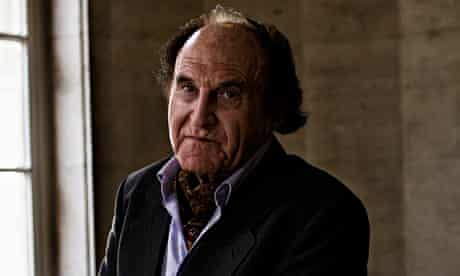Death of an Enquiring Mind
 |
| Otto Dov Kulka. Photo: Sarah Lee/The Guardian |
"Each and every one of us had his or her own story of survival. Either in the camps or in hiding or in the mountains. But we never talked about it. It was immaterial. Because we were participating in this great historical event of a people returning after 2,000 years and building a new culture and new language and new society – it was so overwhelming that we regarded our past as something irrelevant. It's not completely true that people didn't want to hear. We were emerging from [a period of] the utmost inability to take fate in our hands and suddenly we were masters of our own [destiny] … People did not regard [the past] as essential. It was behind them. But in my dreams and diaries I lived a double life.""I wish to enter the mind of Eichmann so that I can understand. They believed that they wished to save human society from this plague, this threat … When Eichmann said he believed that his deeds were good, I believed him. I think he thought he was doing good [ridding the world not only of Jews' physical existence – but of the Jewish idea], the unity of the world and the equality of man.""[Once the ideological tide evaporated, Germans and others] went back to being normal human beings, liberal citizens. It is part of our history. It has its precedent … It's not only possible, it was possible."Otto Dov Kulka, 1933 - 2021
This is a survivor, a man among others who managed to endure and survive a national institutional carefully planned and orchestrated genocide. Unlike many others who survived the Final Solution, this man went on to become a noted historian, teaching for decades at the Hebrew University of Jerusalem; his specialty, the origins of Nazi ideology and the Holocaust. It was not even imagined that he wrote and taught of a time in history that he himself was part of. Ten years of age, deported from Terezin in Poland to Auschwitz.
From a proverbial shtetl to a death camp the purpose of which was the annihilation of Europe's Jews. Methodically undertaken by Aryan fascists who believed Jews were a viral infection on the world body, and the Third Reich was prepared to rid the world of their presence, along with the mentally and physically impaired, homosexuals, Roma, political dissidents; but above all, the Jews, their pestilential presence an affront to humanity.
Professor Kulka was eventually persuaded by another historian who had read snippets of scribbling that attested to Otto Kulka's personal experience. A man the world knew only as an award-winning Israeli historian. A man withal, who as a boy survived Theresienstadt and Auschwitz, the memories of which haunted him throughout his 87 years. The book he wrote, published in 2013, Landscapes of the Metropolis of Death: Reflections on Memory and Imagination, was translated into 17 languages, informing the world of what he had experienced.

Literary honours in recognition of his past, his present and his mastery of a horrific topic -- a 20th Century genocide of unprecedented proportions -- gained him recognition internationally along with the Jewish Quarterly-Wingate literary prize in Britain. Historian Ian Kershaw, who had persuaded Professor Kulka to write of his own experience for posterity, spoke of his memoir as "one of the most remarkable testimonies to inhumanity that I know".
He did not experience, as a child in the Auschwitz 'family camp' the "acute, murderous destructive discord and torment felt by every adult inmate", with no idea of the camp's true purpose; rather, he was curious about whether the perimeter fence was "really electrified", daring himself to touch it. The scars that resulted, physical and psychological, served as a constant reminder. Not for him the nomenclature "Holocaust" or "Shoah", preferring "the final solution", since he felt it vital his students understand the specific nature and purpose of Nazi genocidal policies; to eradicate not merely Jews but Jewish books, art, culture; history.
Born Otto Deutelbaum in Novy Hrozenkov, a small town in Moravia the Czech province, to Jewish parents, he took on his mother's maiden name after the war. His mother died in 1945, when he was 12, in Stutthof concentration camp, while his sister and other relatives were murdered in other camps. Emigrating to Israel at age 15 in 1945, he studied at the Hebrew University of Jerusalem, becoming a distinguished professor there, and at Goethe University in Frankfurt, Germany.

Labels: Historian, Holocaust, Otto Dov Kulka, Survivor
0 Comments:
Post a Comment
<< Home